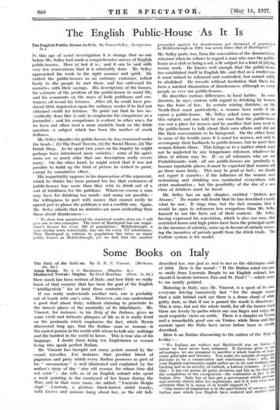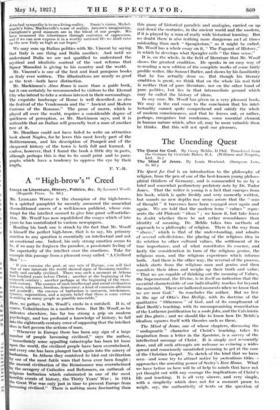Some Books on Italy
The Italy of the Italizns. By E. R. P. Vincent. (Methuen. lOs. 6c1.) Alma Roma. By A. G. Mackinnon. (Blackie. Gs.) Mediaeval Towns : Naples. By Cecil Headlam. (Dent. 5s. 6d.)
110w much has been written of Italy, and how little we really know of that country that has been the .goal of the English " intelligentsia " for at least three centuries !
If one really understands another race, one is probably out of touch with one's own. However, one can understand a good deal about Italy, without claiming to penetrate to the inmost places of the mentality of its inhabitants. Mr. Vincent, for instance, in his Daly of the Italians, gives us some vivid and intimate glimpses of life as it is really lived on the peninsula which emphasize the fact, which Byron discovered long ago, that the Italian—man or. woman—is the easiest person in the world with whom to talk airy nothings and the hardest in the world to know. This is true also of his language. I doubt there being ten Englishmen or women living who speak perfect Italian.
Mr. Vincent has brought out many points missed by the casual traveller. For instance, that peculiar blend . of paganism and piety which every Italian possesses as part of his " unconscious " is well illustrated and explained by the author's story of the " nice old woman for whom time did not exist " : she tells us of an English colonel who spent a week painting in the courtyard of her house during the War, and in that same room, she added, "Lucrezia Borgia slept "--Lucrezia, a glorious black-haired sinful beauty, with knives and poisons hung about her, as the old lady
described her, was just as real to her as the dilettante soldie Of 1918. Here is the moral : " If the Italian mind can pass so easily from Lucrezia Borgia to an English colonel, how
should it hesitate between Pan and St. Paul ? seems to me neatly pointed. .
Motoring in Italy, says -Mr. Vincent, is a sport of its own• everyone driving excessively fast " for the simple reason that a mile behind each car there is a dense cloud of white gritty dust, so that if one is passed the result is disastrous. This is true, but not the whole truth, for off the beaten track there are lovely by-paths where one can linger and enjoy the most exquisite views on earth. There is a chapter on Verona and a remarkably good one on Venice, while Siena and that ancient sport the Patio have never before been so vividly described.
Here is an Italian discoursing to the author of the Italy of to-day :-
" We Italians .are realists and Machiavelli was an Italian cf whom we have never been ashamed. If faecismo gives us real advantages, 'we are prepared to sacrifice a whole heaven of demo- cratic principles and-theories. You make the mistake of supposing fascism° to be a conservative and reactionary. force : why, Sir' your English reactionaries might-rather see in its vast worldng:ello backing and in its novelty of outlook, a Labour tyranny. It is not that it has cut- across all party divisions and has as its chief sinn the completion -of • the risorgimenio—the realization in fact of the Italian idea. Italy has at last got a government which profess" and actively strives after her aspirations, and if it w6re even mow arbitrary than it is, many of us would support it." " Our -s-ource of inspiration is in the past history of our race : lf!itt Italian past. which you English have isolated and studied zit°
detached sympathy is to us a living reality. Dente's visiop, Sense of :reality, Ariestio's- imagination, Castiglione's good manners are in the: blood of our people. We have treasured the inheritance through centuries of oppression, and if we can now express it in a worthy national life we shall raise up the new Italy as high as our hopes."
We may sum up Italian politics with Mr. Vincent by saying that Italy is one thing and Italia another. And until we understand Italia we are not qualified to understand the mystical and idealistic content of the vast reforms that Signor Mussolini is giving to his country and the world.
Mr. Vincent's is one of the best and least pompous books on Italy ever written. The illustrations are nearly as good as the text—both have distinction.
Mr. Mackinnon's Alma Roma is more than a guide book, but it can certainly be recommended to visitors to the Eternal City who intend to take a serious interest in their surroundings. The exquisite landscape of Rome is well described, as also the festival of the Vendemmia and the " Ancient and Modem Customs of the Romans." The game of morra, which is played all over the world, requires a considerable degree of quickness of perception, as Mr. Mackinnon says, and it is noticeable that an Italian will generally beat a man of another race at it.
Mr. Headbun could not have failed to write an attractive hook about Naples, for he loves this most lovely part of the Mediterranean, and his description of Pompeii and of the chequered history of the town is both full and learned. I confess, however, that I found the hook a little dry in parts, although perhaps this is due to its small print and to para- graphs which have a tendency to oppress the eye by their length, F. Y.-B.



























































 Previous page
Previous page